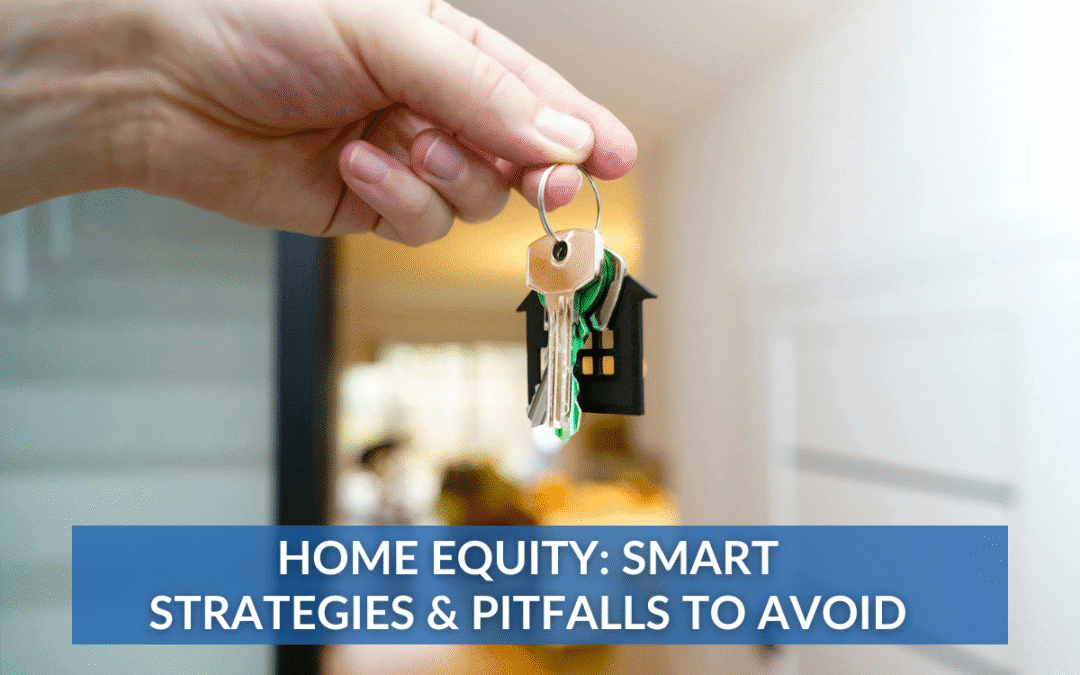Few tools are as powerful as home equity when it comes to building wealth through owning a home. It’s one of the most valuable advantages of owning a home and can be a great stepping stone to achieving financial goals. However, as often seen in the world of homeownership, it comes with its own set of risks if not used properly.
What is Home Equity?
Home equity is the portion of your home that you truly own; it’s the difference between the market value of your home and the amount you still owe on your mortgage.
Let’s say your home is worth $400,000 and you owe $250,000. That means that your equity is $150,000.
You can build equity over time in two ways:
- Paying down your mortgage balance
- Through appreciation as your home’s value increases
Equity can increase passively, just by making regular payments on your mortgage and staying in your home as the market grows.
Smart Ways to Use Home Equity
- Home Improvement
Investing in your property is one of the most popular and practical uses for home equity. Improvements like renovations, upgrades, or additions can improve your quality of life and increase the value of your home.
- Debt Consolidation
If you have high-interest debt, using home equity to consolidate can be a smart financial move. Home equity loans or HELOCs (we’ll talk about these in a minute) typically have much lower interest rates, helping you save money and simplify your payments.
- Education Costs
Some homeowners use equity to cover education expenses, either for themselves or their children. This strategy can be especially helpful if the interest rates on student loans are higher than the rate on your home equity loan.
- Investment Opportunities
In some cases, tapping into your home equity can help fund investment opportunities, like a second property or starting a business. However, this should be approached with caution and with an understanding of the risks involved.
- Emergency Fund
Some homeowners choose to set up a HELOC as a safety net. You don’t have to use it unless needed, but it can provide peace of mind knowing that you have access to funds in case of unexpected expenses.
Pitfalls to Avoid
- Using Equity to Fund your Lifestyle
While it may be tempting to use your home equity for vacations, luxury purchases, or other non-essential expenses, doing so can put your financial future at risk. Your home is your most valuable asset- try not to jeopardize it for short-term gratification.
- Borrowing More than You Need
It’s easy to be lured by large sums of money through equity loans or HELOCs. Borrowing more than you truly need, however, increases your debt and monthly payments.
- Not Having a Plan to Repay
Tapping into your home equity without a clear strategy for repayment can lead to long-term financial issues. Always make sure you have a clear plan for repaying the borrowed amount.
- Ignoring the Market
Housing markets can be unpredictable. If the market dips and your home value decreases, you could end up owing more than what your home is worth- making it especially risky if you borrowed a large amount of your equity.
- Not Understanding the Terms
ALWAYS read the fine print. Whether it’s a home equity loan or a HELOC, understand the interest rate (fixed or variable), repayment terms, and any fees involved.
To avoid these missteps, it’s important to work with someone who understands both the opportunities and the risks of using home equity. The team at Strategic Mortgage Solutions can help you make informed decisions- not just quick ones!
HELOC vs. Home Equity Loan
A home equity loan is a lump-sum loan with a fixed interest rate and a set repayment period. It’s a good choice for large, one-time expenses like home renovations or debt consolidation.
HELOC, or a home equity line of credit, functions more like a credit card. You get a revolving line of credit with a variable interest rate and can borrow as needed during the draw period. HELOCs offer more flexibility, but can be riskier if not carefully managed.
How Much Equity Can You Use?
Most lenders allow you to borrow up to 80-85% of your home’s appraised value, minus what you owe on the mortgage. Using the earlier example of a $400,000 home with a $250,000 mortgage:
- 85% of $400,000 = $340,000
- $340,000 – $250,000 = $90,000 available in equity
The exact amount you can access will depend on your credit score, income, and lender guidelines.
Should You Tap into Your Home Equity?
You can probably anticipate our answer to this: it depends! Take a look at what your goals are, how your financial stability is, and the amount of discipline you have. If you’re planning to reinvest into your home, reduce higher-interest debt, or handle a major life expense responsibly, using home equity could be a smart move. It should never be your go-to source for everyday spending or temporary wants.
Home equity is a powerful tool, but only when used wisely. Understanding the strategies and potential pitfalls is crucial to protecting your home and your financial future.
At Strategic Mortgage Solutions, we specialize in helping homeowners make informed decisions about home financing. Whether you’re considering a HELOC, home equity loan, or simply want to understand your options, our team is here to help!


